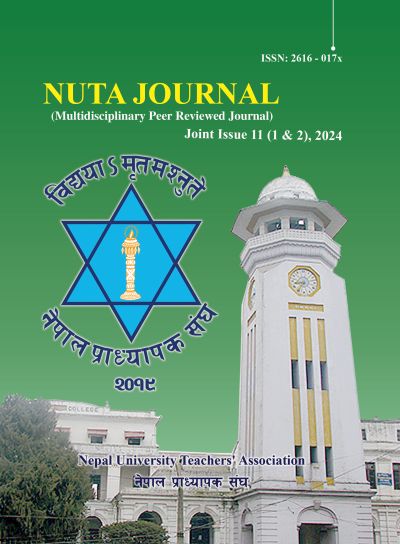Issues and Challenges of Ethnicity in Nepal: Arguments Against Primordial Conception
DOI:
https://doi.org/10.3126/nutaj.v11i1-2.77026Keywords:
ethnicity, primordial conception, constructivism, inclusion, right to self-determinationAbstract
This article seeks to invalidate the primordial conception, manifested in academia and activism in Nepal arguing that ethnic identities are not fixed and given rather they are contingent and fluid. The fluidity takes the shape during the interaction and communication of different ethnic groups and communities. The continual intergroup interaction contributes to construction of mix-identities. The process of making mixed identities reject the scholarly view that ethnicity is biological. Biological traits of ethnicity further lose its shape in the process of migration that forms the identity in different way. Notwithstanding the reality of loss of territorial inhabitation of specific ethnic groups as it were in the past, ethnic scholars and activists voiced the idea of ethnic federalization which was already invalidated by the constitution of 2015 AD. Stating that, our argument is not against the inclusion, representation and dignity of the marginalized groups in Nepal. The issue of language and proper representation of the ethnic groups are to be addressed and include diversity of the groups in mainstream. In contrast, the issue of right of ethnic self-determination in the back of ethnic federalization is not feasible because of the existence of diverse ethnic and non-ethnic groups and also their cohabitation throughout Nepal. This article also seeks to discuss the challenges ethnic movement experiences. The party affiliate and indoctrinated movement has lost its independent character on one side and the failure of ethnic based political parties demanding on ethnic federalization explicitly and implicitly on the other proves that right of self-determination in invalidated. This study is purely qualitative. To argue against the spirit of primordial conception, Content analysis has been chosen as the method.
Downloads
Downloads
Published
How to Cite
Issue
Section
License
© Copyright by NUTA JOURNAL
All Rights Reserved. No part of this Journal may be reproduced in any form or by any electronic or mechanical means, including information storage and retrieval system without prior permission in writing from the publisher, except by a reviewer who may quote brief extracts while reviewing.

